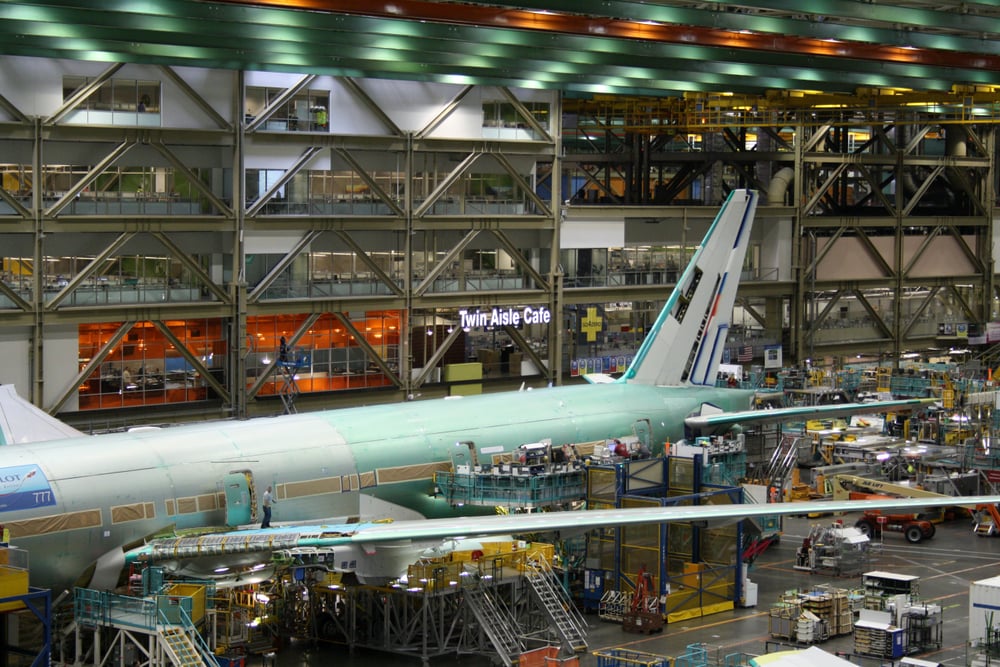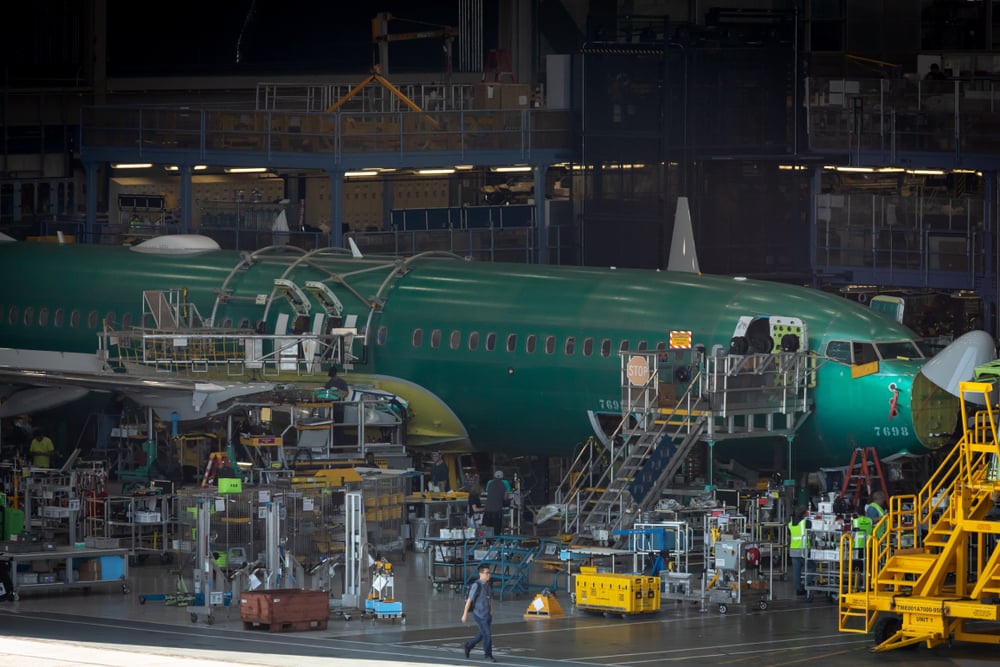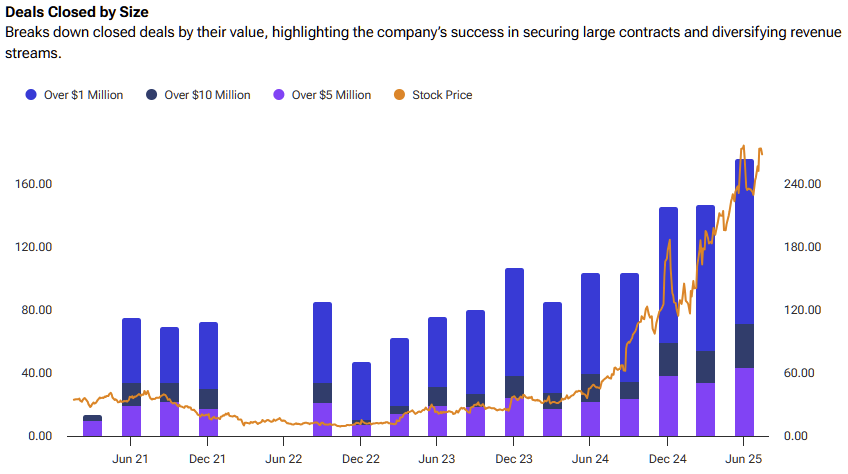Palantir Technologies (PLTR) has pivoted back toward defense with a major enterprise-class win: its newly announced partnership with Boeing’s (BA) Defense, Space & Security (BDS) unit. The financials are one thing: still unclear and unlikely to move dials on their own. More importantly, the deal underscores how Palantir has spent recent years stretching its reach—from military systems into retail, franchise, and SMB supply chains—and is now returning to its core mission of powering national security.
Claim 50% Off TipRanks Premium
- Unlock hedge fund-level data and powerful investing tools for smarter, sharper decisions
- Stay ahead of the market with the latest news and analysis and maximize your portfolio's potential
TipRanks readers may recall that earlier this month, the billion-dollar defense contractor hosted its annual “AIPCon” conference, introducing a “new wave” of customers using its Foundry and AIP products to accelerate drug development, coordinate disaster response, optimize fleets, revitalize U.S. manufacturing, improve healthcare delivery, and—perhaps most relatable to the average American—manage perishable supply chains.
PLTR’s technology, being used by Subway restaurants, may seem small fry compared to multibillion-dollar missile programs, but it validates that its AI tools can function beyond large corporate clients—even in small and medium-sized franchise settings. Still, while opportunistic commercial forays into small-business projects drive diversification, they lack the scale, margins, and prestige that defense contracts deliver. PLTR’s deal size growth tells the tale:
The Boeing partnership shows that leopards don’t change their spots, and that scale beats breadth when it comes to CEO priorities. PLTR’s head of defense, Mike Gallagher, expects Boeing’s production to be “turbocharged,” noting, “America’s enemies aren’t slowing down, so neither can we.”
Could it be that PLTR is less active in perishable supply chains because there are fewer enemies in food distribution than on battlefields? Probably not. More likely, the wide margins in defense are simply too tempting.
What Boeing Gets for Its Money
Under the agreement—though executives at both firms have remained tight-lipped on financial details—BDS has agreed to adopt Palantir’s Foundry platform, an AI system designed to unify complex, disparate data into a single interface.

Spanning more than a dozen production lines for combat aircraft, rotorcraft, missile systems, satellites, and spacecraft, Boeing will use Foundry to standardize analytics, accelerate delivery schedules, and provide unified oversight across its globally distributed factories. In fact, Boeing’s Everett facility features the largest building in the world by volume, spanning over 4,280,000 square feet (approximately 472 million cubic feet). Moreover, Palantir will lend its expertise and capabilities to “undisclosed classified programs” tied to “the most sensitive defense missions,” according to Boeing.
What Palantir Gets from the Deal
The Boeing tie-up signals Palantir reasserting itself in defense, where it first built credibility. In recent years, it has aggressively pushed into commercial domains—particularly with franchises, retailers, and mid-sized businesses—to prove its AI can operate beyond war rooms. A prime example is Subway, where Palantir’s AIP was deployed across 22,000 Subway franchises to streamline supply chains, reduce food waste, and scale logistics across fragmented operators.
Meanwhile, PLTR’s financials are booming. In Q2 2025, it surpassed $1 billion in quarterly revenue for the first time, achieving 48% year-over-year growth. Domestic sales were up an eye-watering 93%. Understandably, the firm raised full-year guidance and projected ~50% growth in Q3. Despite the tills ringing and PLTR executives on the PR offensive, Wall Street analysts are far from convinced. Most leading analysts remain Neutral with ~11% downside expected.

As the naysayers remain skeptical, Palantir stock waits for no one; rising almost 140% year-to-date and a pulse-raising 383% gain over the past twelve months. Only crypto investors could dream of such multiples in such a short time.
In the meantime, focusing on the most meaty deals makes sense for PLTR. The defense market remains its highest-margin, highest-stakes domain—and Boeing offers a marquee platform to showcase Foundry at scale in sophisticated manufacturing. In the Trumpian era, there’s also the positive PR effect that always counts.
Why Boeing Gains
Boeing gains a premier technical partner with proven experience in scaling decentralized environments, particularly in AI applications. The company has long struggled with siloed systems, inconsistent data, and fragmented analytics. Foundry will enable BDS operations to converge on a single data architecture, allowing for faster feedback loops, creating virtuous production circles, stronger forecasting, and tighter control over production timelines across its sprawling footprint.

Given Boeing’s role as a leading exporter and defense contractor, the partnership also carries geopolitical weight and PR value. More reliable AI-enabled production enhances U.S. and allied capability to “support uniformed personnel in protecting freedom around the world,” as BDS CEO Steve Parker put it. Standing shoulder to shoulder with the U.S. government at a time of geopolitical strife gives Boeing reputational capital it will surely leverage in years to come.
Palantir’s Boeing Pact Marks a Return to Defense Roots
This week’s Boeing deal marks a return-to-source moment for PLTR, following some neat diversification efforts over the past few months. Now integrated with Subway franchisees to optimize supply chains, the firm has not forgotten to reaffirm that its core strength lies at the intersection of defense and AI. PLTR shareholders may argue the Pentagon’s appetite matters more than that of food distributors, but the great news is that both can feast at its AI trough—each paying a fair price for the privilege.
For Boeing, the value is clear: a modern, scalable analytic backbone to unify factories, as well as streamlined and accelerated operations. And for PLTR, the contract marks a course correction—returning to its highest-margin domain, thereby reinforcing its credibility in national security, and proving that even as AI becomes ubiquitous, some missions are more critical than others.

















